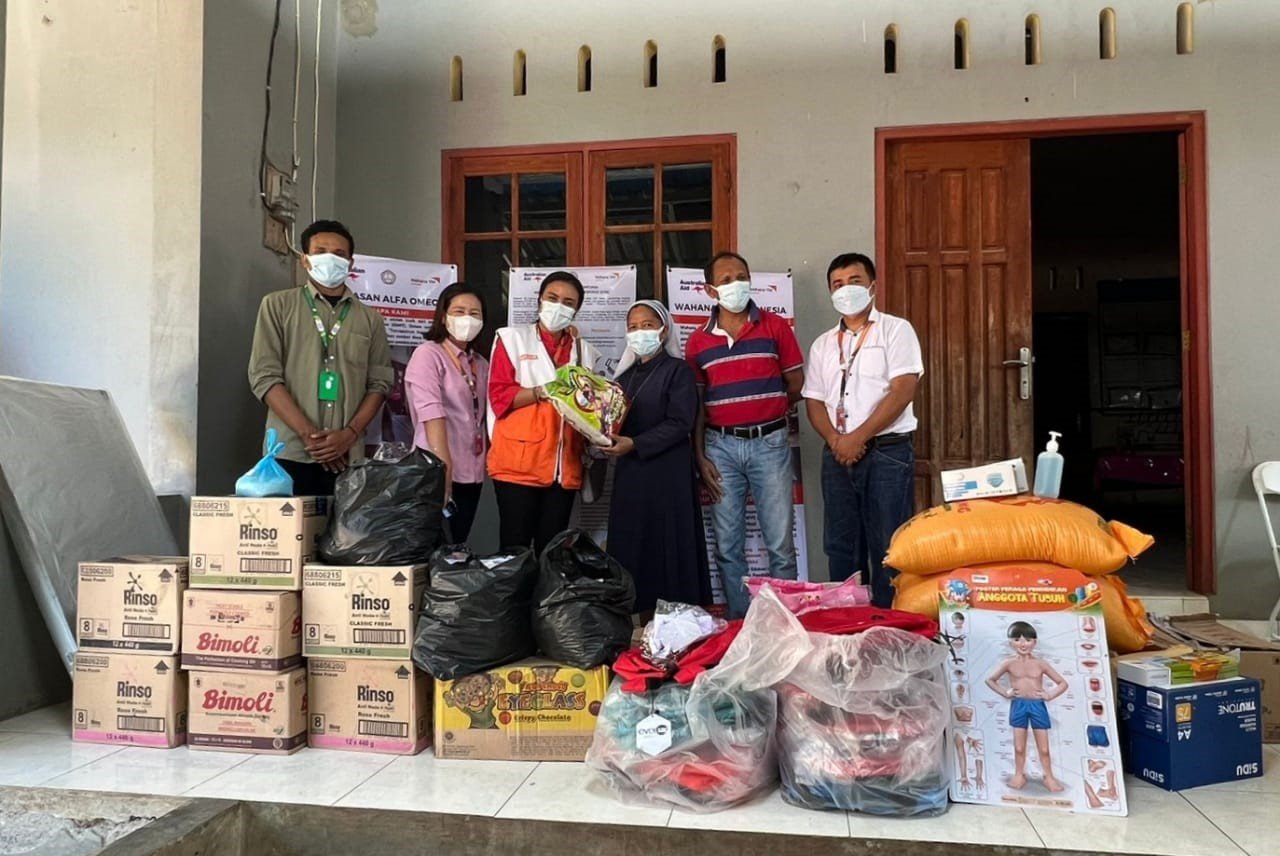Reducing the impact of the pandemic on children with disabilities in Indonesia
Above: Early education teacher, Junita (left) next to Sister Rinche (right), in one of the classrooms at Bhakti Luhur Orphanage and School. Photo: Yvanah Hernandez/World Vision Australia
The Bhakti Luhur Orphanage school is managed by the Sisters of the Association of Institutes for Lay Missioners (ALMA) in Kupang, East Nusa Tenggara, Indonesia. It provides care, shelter, and early childhood and elementary schooling for children with disabilities including those with physical disabilities such as deafness and hearing loss; developmental disabilities such as down syndrome and autism; psychosocial disabilities such as depression; and intellectual disabilities and neurodiversity.
Whilst the school receives infrastructure and teacher salary support from the Government and the Church, unfortunately, at the height of the pandemic in 2020 and 2021, it struggled to meet the daily needs of its residential students, who have no family support, and maintain its educational resources.
Sister Rinche, the Head Sister and Principal of the school, was extremely worried about their resourcing, as she didn’t want past traumas to resurface for students who had come from socially and economically vulnerable families. Many had faced severe forms of neglect and abuse.
Bhakti Luhur Orphanage is the only residential school for children with disabilities in Kupang. Sister Rinche was motivated to keep internal classrooms and activities running amid COVID-19 lockdowns for the students and Sisters that reside within the grounds.
“During the pandemic, we made sure that the classrooms were still active for the children, as our responsibility is to serve the children,” says Sister Rinche.
Thanks to the support of the Australian Humanitarian Partnership (AHP), through World Vision’s Indonesian COVID-19 Surge Response, and the assistance of local partner, Yayasan Alfa Omega, the school was identified for cash assistance to help provide necessities amid rising living costs, assistive devices like wheelchairs, and education support.
The response focuses on assisting the most vulnerable families and children impacted by COVID-19 with social protection and safe education. This includes distributing cash assistance to people with disabilities, economically vulnerable households, indigenous groups, people living with HIV/AIDS, female-headed households, the elderly, and vulnerable children.
The Bhakti Luhur Orphanage received two cash transfers of IDR 600,000 (AUD 56) for each for its 38 residential students.
“The cash and voucher assistance was helpful for us to provide the children with what they needed [for school and overall wellbeing]. We are happy to have met World Vision and its local partner Yayasan Alfa Omega through this project [supported by AHP]. We feel that we’re not alone and that people still care for our mission,” said Sister Rinche.
Above: World Vision Indonesia and Yayasan Alfa Omega staff with Sister Rinche during the distribution of school supplies purchased with cash and voucher assistance. Items were purchased based on the needs of the children, and included clothes, educational resources, and food. Photo: Petrus Adu/Yayasan Alfa Omega
While all students at the school have received two COVID-19 vaccines through Government initiatives, some students were distressed by the ongoing pandemic and emergence of new variants. Thanks to AHP support, World Vision and local partner, Yayasan Alfa Omega, also rolled out psycho-social support after lockdowns at the Orphanage, to help children acknowledge frustrations or anxiety about the pandemic and build their resilience.
The Bhakti Luhur Orphanage school currently has 80 students (including 45 early education students), with 38 students in residential care.
As of October 2022, World Vision has provided 5,422 children with psycho-social assistance and materials for COVID-19 support at communities and schools across East Nusa Tenggara, West Nusa Tenggara, Central Sulawesi, North Maluku, and Papua through the AHP-supported response.



